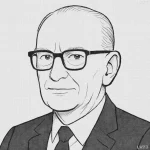“If an elderly but distinguished scientist says that something is possible, he is almost certainly right; but if he says that it is impossible, he is very probably wrong.”

- December 16, 1917 – March 19, 2008
- British
- Science Fiction Writer, Futurist, Inventor, Author of 2001: A Space Odyssey
table of contents
Quote
“If an elderly but distinguished scientist says that something is possible, he is almost certainly right; but if he says that it is impossible, he is very probably wrong.”
Explanation
This quote is one of Arthur C. Clarke’s Laws, specifically his First Law, and it offers a pointed commentary on the nature of scientific progress and the fallibility of authority. Clarke suggests that when a seasoned scientist asserts that something can be done, their deep understanding lends credibility. But when they claim something is impossible, their judgment may be clouded by the limitations of current knowledge or past experience, which can blind even great minds to future breakthroughs.
Historically, many innovations once deemed impossible—like heavier-than-air flight, space travel, or wireless communication—were eventually realized. Clarke observed that scientific advancement often outpaces the imagination of even the most knowledgeable experts, especially those whose perspectives have been shaped by outdated paradigms. Thus, the quote serves as a reminder that expert consensus is not infallible, and that progress often comes from challenging entrenched beliefs.
In the modern era, this principle applies to fields such as AI, quantum computing, and biotechnology, where rapid developments continue to overturn old assumptions. Clarke’s insight encourages openness, especially among younger innovators, to pursue what is not yet proven, regardless of authoritative skepticism. It champions curiosity over complacency and affirms that scientific truth is always evolving.
Would you like to share your impressions or related stories about this quote in the comments section?
